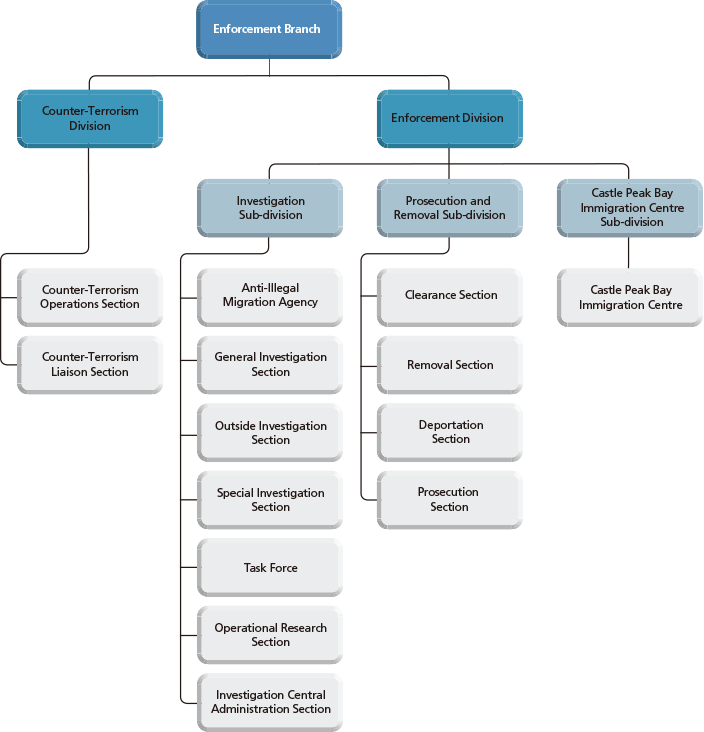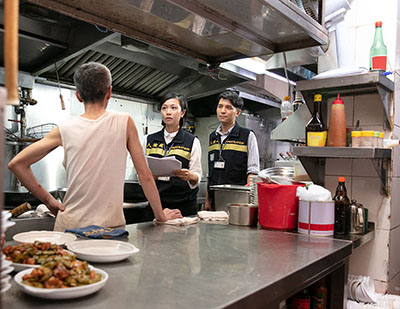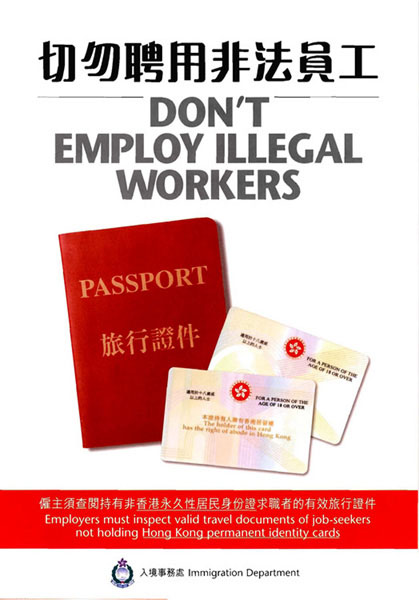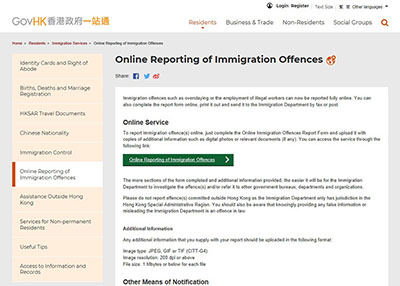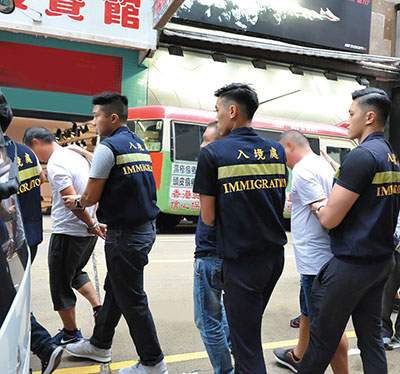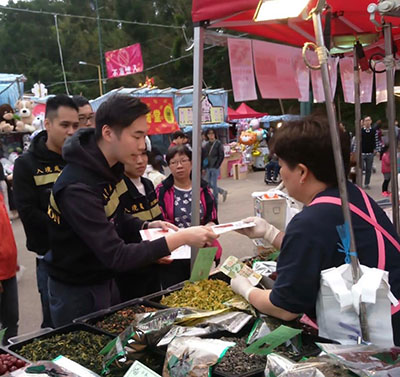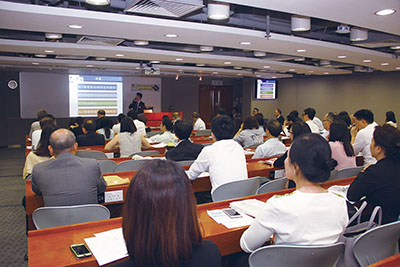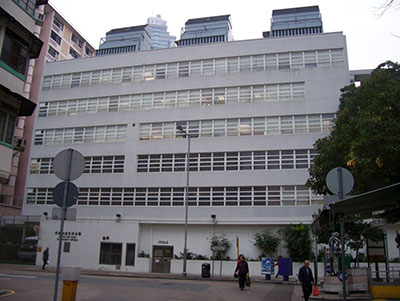Enforcement Branch
Under the command of an Assistant Director, the Enforcement Branch comprises the Enforcement Division and the Counter-Terrorism Division. Each division is headed by a Principal Immigration Officer.The Enforcement Division is responsible for formulating and implementing policies in respect of investigation, deportation and removal. It is also responsible for prosecution of immigration offenders and management of the Castle Peak Bay Immigration Centre for detention of persons of 18 years old or above. The Counter-Terrorism Division is responsible for formulating departmental strategies relating to counter-terrorism (CT) and taking relevant enforcement action, and liaising with local, Mainland and overseas law enforcement agencies as well as consulates in Hong Kong for CT intelligence exchange. Officers of the Counter-Terrorism Division also serve as the Department’s representatives in the Inter-departmental Counter Terrorism Unit (ICTU).
Investigation and Intelligence
The Immigration Department has made concerted efforts to uphold the laws of Hong Kong by investigating into offences under the Immigration Ordinance and the Registration of Persons Ordinance, and offences relating to the registration of births, deaths and marriages; instituting removal and deportation proceedings against illegal immigrants and undesirables; and maintaining intelligence on global immigration matters.
Anti-Illegal Migration Agency
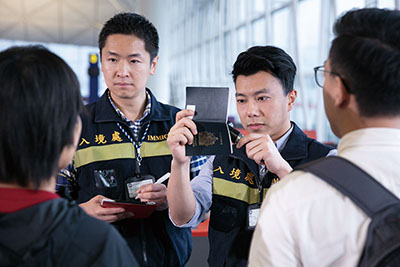
Mainland Illegal Immigration
In 2018, the number of Mainland illegal immigrants intercepted was 555 and none of them was involved in sex work. There was no surrendered pregnant Mainland illegal immigrant in 2017 and 2018.
After the gazettal of the application procedures for the Certificate of Entitlement in July 1999, the number of surrendered minor illegal immigrants from the Mainland declined sharply. In 2018, there was no case of surrendered minor, while there was only one case in 2017.
Unlawful Employment
In 2018, the Department continued to maintain high vigilance on the problem of illegal workers and actively took tough and effective enforcement action against unlawful employment of illegal immigrants, visitors, foreign domestic helpers and imported workers who were subject to specific employment conditions so as to protect the local labour market. Measures taken included publication of related government policies and regulations, and frequent surprise checks on factories, restaurants, food production factories, shops, markets, foot reflexology centres, residential and commercial premises under renovation, cemeteries, refuse collection points and waste materials recycling factories, container depots and warehouses situated in the border and rural districts in the New Territories. In 2018, 6,290 illegal workers, including 4,507 persons engaged in sex work, were arrested, which represents a slight increase of 4.2 per cent as compared with 6,038 in 2017. Most of the illegal workers were prosecuted and fined or imprisoned before repatriation to their places of domicile. Moreover, section 38AA of the Immigration Ordinance came into effect on 14 November 2009, which prohibits illegal immigrants or people who are subject of a removal order or deportation order from taking any employment, whether paid or unpaid, or from establishing or joining in any business. Since the Ordinance came into effect till the end of 2018, 2,132 persons were arrested on suspicion of breaching the Ordinance.To combat offences relating to parallel trading activities, the Department has stepped up enforcement action by mounting a series of anti-illegal worker operations codenamed ‘Windsand’ since September 2012. As at the end of 2018, a total of 598 operations were conducted with the apprehension of 3,455 Mainland visitors for breaching their conditions of stay by suspected involvement in parallel goods trading, and 19 local employers suspected of employing illegal workers. Among them, 231 Mainland visitors were convicted and sentenced to imprisonment ranging from four weeks to three months. According to the existing mechanism, the Department would pass the particulars of those Mainland visitors who have been convicted of illegal employment in Hong Kong to the Mainland authorities for cancellation of their exit endorsements and they would be prohibited from visiting Hong Kong for two years. For persons suspected of being involved in parallel goods trading but were not prosecuted, their future arrival would be closely scrutinised. They will be refused entry and repatriated to the Mainland immediately if their purposes of visit are dubious.
To strengthen crime prevention measures and enforcement action against illegal activities, including unlawful employment, an inter-departmental task force comprising the Immigration Department, Hong Kong Police Force, Customs and Excise Department, Labour Department, Correctional Services Department and Food and Environmental Hygiene Department was set up in April 2003.
Furthermore, for enhancing the effectiveness of curbing the problem of unlawful employment, the Department set up an Anti-illegal Workers Combat Squad in January 2005 to provide a more speedy and robust combat force against illegal workers and their employers. The squad conducts plain-clothes patrol duties at black spots of illegal workers and takes speedy action on reports of unlawful employment.
Employers of illegal workers were also prosecuted. In 2018, 283 employers were prosecuted for employing illegal workers. Many of the prosecuted employers were sentenced to jail. As a deterrent measure against unlawful employment, the Court of Appeal (CA) laid down a sentencing guideline in September 2004 reaffirming that employing a person not lawfully employable is a serious offence and the employer of an illegal worker should be sentenced to an immediate custodial sentence even for the first offence. The CA also stated that the presence of aggravating features, such as an element of exploitation, multiple employment of illegal workers or a repeated offence, will in most cases substantially increase the guideline sentence. In addition, the government is considering amending the relevant provisions of the Immigration Ordinance to increase the penalties for employing persons who are not lawfully employable.To prevent illegal workers from taking up renovation works in public and private housing estates, the Department issued guidelines to enhance proper record keeping of flats under renovation and the particulars of the flat owners, contractors and workers. Consequently, there is an obvious decrease in the number of illegal workers taking up renovation work in well-managed housing estates.
On the issue of illegal workers using or in possession of a forged or other person’s identity card, the CA handed down a sentencing guideline in March 2005. The Court found that for an offence of possession of a forged/other person’s identity card, even when the offender’s presence in Hong Kong is legal, the sentence should be 12 months’ imprisonment after a guilty plea. If the forged/other person’s identity card had been presented/used to conceal one’s status, so as to seek unlawful employment or to further one’s illegal stay in Hong Kong, the sentence should be 15 months’ imprisonment after a guilty plea.
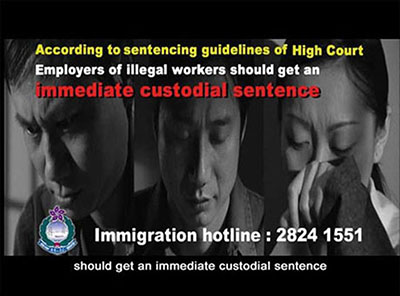
Immigration Task Force
Apart from conducting enforcement operations against immigration offenders, the Immigration Task Force also reinforces offices which require additional manpower resources to cope with the upsurge of workload. In 2018, 15,684 enforcement operations, including 574 large-scale joint operations with other government departments, were conducted. A total of 5,688 immigration offenders were arrested.During the year, in order to curb the prevailing trend of unlawful employment, the Task Force also conducted a number of special operations codenamed ‘Twilight’, ‘Champion’ and ‘Flabbergast’ against illegal workers in various businesses. The Task Force will continue to step up enforcement action against illegal workers and their employers to protect job opportunities of the local workforce.
To step up publicity campaigns against the hiring of persons not lawfully employable and to raise public awareness of the serious consequences of unlawful employment. The Department from time to time distributes ‘Don’t Employ Illegal Workers’ leaflets to store-keepers and disseminates the message in the talks or seminars organised by estate management companies, other government departments and public organisations when necessary.Investigations into Forged Documents
The Department is extremely concerned about the use of forged travel documents, either for illegal migration, crimes or terrorism. Such illicit activities pose threat to immigration control and the security of the countries concerned and undermine the probity of the passports being forged. As syndicated forgery activity is a global problem, the Department works closely with the local, Mainland and overseas law enforcement agencies. Resolute actions are taken to detect the use of forged travel documents by travellers and illegal migrants who are in transit through Hong Kong to other countries. In 2018, the Department conducted 28,982 anti-forgery operations. The number of forged travel documents detected was 449, representing a decrease of 12.8 per cent as compared to 515 in 2017.
Since the issue of Hong Kong smart identity cards in June 2003, the Hong Kong smart identity card has become a target of forgery syndicates. In 2018, a total of 58 forged Hong Kong smart identity cards were seized during various operations conducted by the Department. To tackle the problem, the Department will continue to conduct various operations, intelligence collation and information exchange with relevant parties.
To achieve more effective results, the Department uses sophisticated equipment to assist in the detection of forged documents. Such equipment includes the Electronic Documentation of Information System on Networks (EDISON), which is a computerised system keeping a large collection of digitised colour images of genuine travel document specimens. The Department is also equipped with Video Spectral Comparators which are particularly effective in the immediate detection of forged and unlawfully altered documents.The Department also makes use of compact hand-held forensic devices and forged document detectors to enable frontline officers to conduct quick examination of doubtful documents on the spot as well as the Face Recognition System (FACES) which is an effective ancillary tool in enhancing the detection of cases of multiple identities.
In addition, the Department uses advanced investigative analysis software and forensic system to assist in the investigation and for detailed analysis of intelligence on forgery and human smuggling syndicate activities.
Operational Research
The Operational Research Section is responsible for collecting, analysing and disseminating information relating to matters of interest to the Department. It keeps track of the modus operandi of human smuggling and the trends on the use of forged travel documents.
The work of the section not only enables the provision of intelligence on immigration matters to the staff within the Department but also enhances the exchange of intelligence with other government bodies, consulates and counterparts of the Mainland and overseas.
During the year, workshops on the identification of forged travel documents and forged Hong Kong smart identity cards were conducted for our in-service officers, local and overseas enforcement agencies. Moreover, talks on security features of Hong Kong smart identity cards and techniques for identifying forged Hong Kong smart identity cards were delivered to personnel of other government departments, financial institutions and the legal sector who were regularly involved in the handling of identification documents.The section also maintains an Enforcement Exhibition Gallery. The gallery highlights the diversity of work and various achievements of the Enforcement Division through the display of photographs, reports of enforcement action, seized exhibits and various kinds of enforcement equipment. Besides, the gallery stores over 37,000 forgery items unearthed by the Department. These items include forged documents such as passports, identity cards, certificates and implements fit for forgery such as stamps and dies. Specimens are also displayed for training and exhibition purposes.
Prosecution, Deportation and Removal
In 2018, 6,059 charges were laid against persons who had committed offences under the Immigration Ordinance and the Registration of Persons Ordinance, and offences relating to the registration of births, deaths and marriages in Hong Kong. Under section 38AA of the Immigration Ordinance which came into effect on 14 November 2009, illegal immigrants or persons who are subject to a removal order or deportation order must not take any employment or establish or join any business. A person committing the offence is liable to a fine of $50,000 and to imprisonment for three years. As at the end of 2018, 2,035 offenders were prosecuted.
The Department also processes deportation and removal order applications to keep out undesirables. In 2018, 501 and 1,245 persons were deported and removed respectively from Hong Kong.
Ma Tau Kok Detention Centre
The Department’s detention centre at Ma Tau Kok has been operating since February 1998. The centre runs round-the-clock and can accommodate up to 87 detainees at any one time. In 2018, 15,437 immigration offenders were admitted to the detention centre.Castle Peak Bay Immigration Centre (CIC)
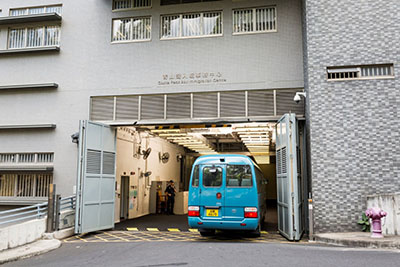
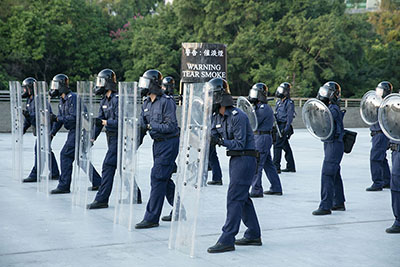
Establishment of the Counter-Terrorism Division
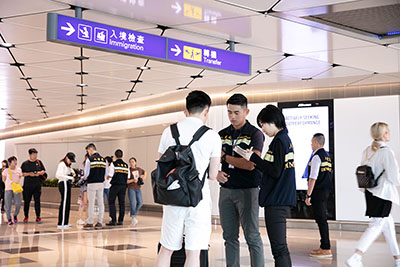
In light of terrorist threat assessment and actual circumstances, the Department will take appropriate control measures and step up interception and examination of suspicious travellers at various control points. The Department will also include the information of visitors suspected of being associated with terrorist activities in a watch list. Any such persons intercepted at control points will be refused permission to land and referred to relevant law enforcement agencies for follow-up. In 2018, a total of 3,909 operations were conducted at Hong Kong International Airport as well as various border and harbour control points, and a total of 14,278 passengers were intercepted for enquiries.
To enhance the professional knowledge and awareness of CT-related issues among its staff, the Department organises internal CT training and drills regularly for effective interception of suspicious visitors suspected to have been involved in terrorist activities. As at the end of 2018, a total of 47 internal CT training sessions had been organised for 2,784 officers, while a total of six CT training sessions had been organised by the ICTU for 326 officers since its establishment.
To enable Hong Kong to remain as one of the safest cities in the world free from terrorist threats, the Department proactively exchanges intelligence with local, Mainland and overseas law enforcement agencies through different channels. Based on the analysed intelligence, the Department exercises effective immigration control in accordance with the law to prevent entry of undesirable persons who may pose a threat to the law and order of Hong Kong.
Combating Mainland Pregnant Women Coming to Hong Kong for Confinement by Illegal Means
The Department is committed to combating Mainland pregnant women giving birth in Hong Kong through illicit means. In 2018, the Department prosecuted six Mainland pregnant women who had overstayed to give birth in Hong Kong and two Mainland pregnant women who gave birth in Hong Kong through illicit means. They were all convicted and sentenced up to 13 months’ imprisonment.
To tie in with the implementation of ‘zero-quota’ policy promulgated by the HKSAR Government in 2013, the Department set up a special task unit in November 2012 to collect relevant data from private hospitals for analysis so as to combat cases of obtaining ‘Confirmation Certificate on Delivery Booking’ for delivery in Hong Kong by means of bogus marriage. As at the end of 2018, a total of 494 doubtful cases were detected from about 32,455 delivery bookings with 51 persons being successfully prosecuted, which included 15 Mainland pregnant women, 30 Hong Kong resident husbands and six intermediaries.
To crack down on illegal hostels for Mainland pregnant women, the Department has worked closely with the Hong Kong Police Force and the Office of the Licensing Authority of the Home Affairs Department in exchanging intelligence and conducting joint operations since February 2012. In 2018, 39 joint operations were conducted to inspect unlicensed guesthouses to deter non-local pregnant women from entering Hong Kong early in order to evade immigration examination.
Combating Illegal Migration and Human Smuggling
Hong Kong is a metropolitan city and an international traffic hub. Forgery facilitators and illegal migrants tend to make use of Hong Kong’s extensive and convenient transportation network as a transit point to seek entry overseas. The Department undertakes an active role in combating illegal activities and contributes in containing and preventing illegal migration from dispersion as well as preventing Hong Kong from being used as a springboard for human smuggling activities. The Special Investigation Section, formed in early 1980s, is specialised in the investigation of organised immigration offences, including human smuggling activities, occurring in or involving Hong Kong. It works closely with other law enforcement agencies in Hong Kong, the Mainland and overseas with the mutual aim to combat organised human smuggling activities.
The Department, from time to time, conducts interdiction exercises at the Hong Kong International Airport to apprehend forged travel document users and forgery syndicate members. The exercises include operations on arrival and departure flights, spot checks of travel documents of arriving and departing passengers inside the transit lounge, at boarding gates and the SkyPier as well as observation operations. In November 2018, the Department conducted a special joint operation codenamed ‘Sky League’ again at the Hong Kong International Airport with the participation of various local consulate representatives as advisers or observers. During the operation, 482 departure/arrival flights and arrival ferries from the SkyPier together with 698 passengers were spot-checked.
At the initial stage of the implementation of the Unified Screening Mechanism, smuggling via the Mainland was one of the main ways of arrival of claimants to Hong Kong. Among them, the majority originated from countries not enjoying visa-free access to Hong Kong, including Vietnam, Pakistan and Bangladesh. The Department is very concerned about the situation, and has been maintaining close liaison and intelligence exchange with the Hong Kong Police Force (HKPF) and the Mainland authorities for joint efforts in combating these illicit activities at source. Since the commencement of the special operations in mid-February 2016, the border control departments and the exit and entry offices of relevant Mainland provinces have taken sustained enforcement action against illegal immigration activities in various Mainland provinces. The effectiveness of the operations has been remarkable. The number of non-ethnic Chinese illegal immigrants (NECIIs) intercepted has been declining significantly since mid-2016. In 2018, a total of 639 NECIIs (a monthly average of 53) were intercepted, a drop of 87 per cent compared with the peak of 1,241 NECIIs (a monthly average of 414) intercepted in the third quarter of 2015. In 2018, the Department conducted nine joint operations with Mainland law enforcement agencies and the HKPF and smashed a number of cross-boundary crime syndicates, resulting in the arrest of 440 involved persons, including over 150 core members of smuggling syndicates.
The Department noted that syndicates arranging entry of NECIIs into Hong Kong would change tactics from time to time, in routes to Hong Kong and in modes of operation. Hence, the Department will continue to work closely with the local and Mainland law enforcement agencies, with vigorous action against illegal immigration activities on land and at sea, as well as cracking down on syndicates.
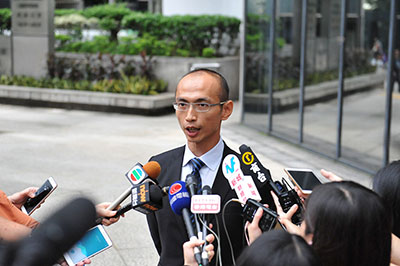
In May 2018, the AIM received intelligence and intercepted a Sri Lankan male and a Canadian male who were involved in illegal migration activities. They pleaded guilty to one count of conspiracy to obtain services by deception and were sentenced to 18 and 22 months’ imprisonment respectively. Meanwhile, the Sri Lankan male also pleaded guilty to one count of possession of a forged travel document and was sentenced to 18 months’ imprisonment. All sentences were to run concurrently, making a total of 18 months’ imprisonment.
In July 2018, a French male admitted that he had received a monetary reward and free air-tickets from a middleman for procuring boarding passes and transferring the boarding passes to a Sri Lanka male and another traveller who intended to board a flight to France. He pleaded guilty to two charges of conspiracy to obtain services by deception at the District Court and was sentenced to 30 months’ imprisonment.
In September 2018, a Korean male admitted that he, having followed the instructions of an intermediary, received remuneration for procuring a boarding pass to Australia with his personal particulars, and falsely claimed to an immigration officer upon departure clearance that he was departing for Australia before leaving the boarding pass inside a washroom in the Airport’s restricted area with a view to transferring it to another person for smuggling to Australia. He pleaded guilty to one count of conspiracy to obtain services by deception and one count of making false representation to an immigration officer at the District Court and was later sentenced to 24 months’ imprisonment.
Combating Bogus Marriages
The Department has grave concerns about non-Hong Kong residents obtaining stay in Hong Kong by means of bogus marriages. These people contracted bogus marriages with Hong Kong residents in order to gain entry into Hong Kong and eventually for settlement.
On 18 December 2006, the Department set up a special task force to collate intelligence through various sources and to conduct thorough investigation with a view to taking prosecution action against offenders.
To further combat bogus marriage cases, the Marriage Registries of our Department have stepped up checking on suspected cases, while the Investigation Sub-division has also initiated investigation into any suspected bogus marriages. With these measures in place, a number of suspected cases were swiftly detected and the persons involved were convicted of relevant offences.
In 2018, a total of 67 persons were convicted of offences relating to bogus marriages and were sentenced to jail terms ranging from 12 to 42 months.The Department has been aware that some criminal syndicates have continually published via newspapers, instant messaging software and social networking mobile applications to induce young people to engage in bogus marriages for huge remuneration. In recent years, the Department smashed four cross-boundary syndicates in a series of operations against bogus marriages codenamed ‘Flashspear’, ‘Snare’ and ‘Tracker’. A total of 382 offenders were arrested in the operations, including two syndicate masterminds, nine core syndicate members, and 371 Hong Kong residents, Mainland residents and foreign domestic helpers who were suspected of participating in bogus marriages. The above operations are ongoing and more arrests may be made.
For persons who have obtained their residence in Hong Kong by fraudulent means, their HKICs and residence status will be invalidated according to the laws of Hong Kong. They will also be subject to removal to their places of origin.
To remind members of the public, including young people, of the serious consequences of participating in bogus marriage, the Department has from time to time disseminated information on crackdowns on bogus marriage syndicates and intermediaries as well as the arrest of persons engaging in bogus marriages through various channels including press releases and media interviews. In addition, the Department also produced a short video to remind the public against falling into the trap of bogus marriages, which has been uploaded to the Department’s YouTube channel. The Department will continue to deliver such messages through various effective means so as to remind members of the public not to participate in illegal activities such as bogus marriages.
Exchange of Intelligence
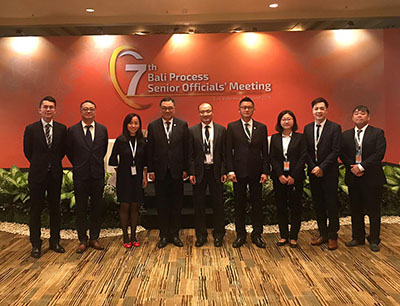
In the fight against illegal migration and terrorism, exchange of information and intelligence on global human smuggling activities and forgery trends is of utmost importance. The Department discusses issues on illegal migration, crimes and terrorism through frequent and regular meetings with major local consular missions. In 2018, the Department actively participated in international and regional conferences and seminars. For example, representatives from the Department attended the ‘6th INTERPOL Global Conference on Human Trafficking and Migrant Smuggling’ held in Nigeria; the ‘7th Ministerial Conference of the Bali Process on People Smuggling, Trafficking in Persons and Related Transnational Crime’ and the ‘Bali Process Border Management Roundtable Discussion - Risks and Emerging Issues in People Smuggling and Trafficking in Persons by Air’ held in Indonesia; and the ‘13th Symposium on Police Studies of the Strait cum Hong Kong and Macao on New Situations of Security Governance and Deepening of Cross-boundary Policing Co-operation’ held in Nanjing. The Department has successfully established an effective communication network as well as working relationship with foreign and Mainland counterparts in facilitating exchange of intelligence and proactive action against illegal migration and terrorist activities. Useful intelligence that may help detecting, disrupting or suppressing illegal migration and terrorist activities will be promptly disseminated through the established mechanism.

